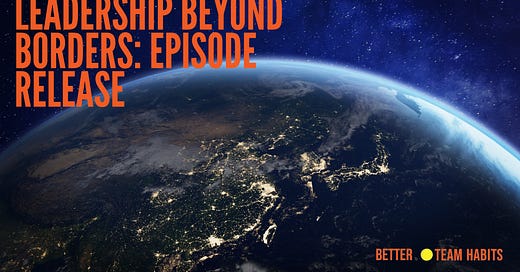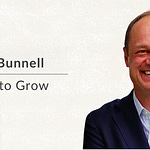Earlier this month Leadership Beyond Borders re-released an episode I did with them a while back, alongside host Kimberli J. Lewis. The conversation centered on how team habits apply in international, remote, and diverse organizations, and to change management. We discussed the need for clear communication as a team habit, with specific channels and protocols, especially on remote and geographically dispersed teams — as well as how to remove bottlenecks and strike a balance between providing enough information and too much detail. Our discussion touched further on the importance of personal connection, trust, and empathy in teams, and how this sense of belonging (another major team habit) ultimately paves the way for high performance.
Leadership Beyond Borders looks at the impact constant change is having on our organizations and how these changes affect the kind of leadership we need to drive long-term success in today’s global economy. The idea of the podcast is to explore the opportunities and challenges of different kinds of organizations (including remote first) and what kind of leadership skills and values are needed to ensure engagement, retention, and ultimately great performance.
Topics We Explored:
Why in order to function within the global business environment, your business needs to constantly change and adapt to a variety of new constants
The power of team habits and dynamics to drive success in today's fast paced business landscape
How to figure out this new way of working with each other, and putting it all back together when everything's broken. (Much in the way it was for so many organizations during the COVID-19 pandemic.)
Why effective communication, collaboration, and interpersonal team leadership improve work outcomes.
Episode Timestamps
[0:05] Team habits and dynamics for business success. Host Kimberli Lewis discusses globalization, digital transition, and leadership impact with listeners worldwide. Charlie shares insights on team habits for success in a fast-paced business landscape.
[4:00] Forging a path in leadership, teams, and productivity consulting. Charlie argues that individuals in organizations are (usually) not the problem, but rather how they come together as a team and create systems that either work or don't work. We all play a part in the construction of our team’s habits, for better or for worse, and that’s important to acknowledge. He emphasizes high standards and compassion in leadership, and the potential for heroes to emerge in unexpected ways.
[11:46] Teamwork, inclusivity, and productivity. Charlie’s upbringing and complex childhood experience informs his approach to work communication management. He prioritizes lifting up those with least privilege and power in organizations.
[17:09] Creating a baseline of trust and mutual respect. Overview of the eight habits of high-performing teams, including belonging, decision making, and goal setting. Meetings are a key area where team habits play out, and poor habits can lead to poor meeting culture. Belonging is especially crucial in virtual teams. Language of trust and relationship often beats out task-based language.
[25:17] Team collaboration and motivation. Understanding individual goals and motivations can help drive team collaboration. Rather than pushing team members towards a goal, it's more effective to help them find their own motivation and support them in achieving it. This requires finding common ground and aligning goals.
[35:05] Decision-making habits for teams, including leveling decisions and addressing bottlenecks. Charlie discusses decision-making as a habit in teams, and explains the three levels of decisions. Decision-making habits (and knowing the decision levels) can transform other team habits and increase trust and belonging. Transparency and enrolling team members in decision-making removes bottlenecks and increases productivity.
[40:58] Effective communication in diverse teams. Communication in diverse teams requires specific channels for urgent vs non-urgent messages. Team members ought to commit to using agreed-upon channels to avoid confusion and ensure clarity. Communication often hinges on providing the right amount of detail. Brief explanation of how women and men communicate differently due to socialization and power dynamics.
[45:33] Productivity, team habits, and getting buy-in. After analyzing a team’s habits a roadmap can be created to improve specific habits. An easy fix on meetings might be leaving five minutes at the end of every call for next actions. Charlie encourages listeners to invite others into the changes they want to make together.














Share this post